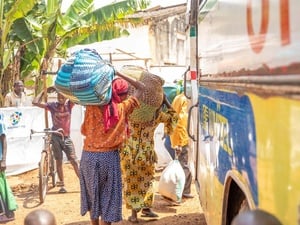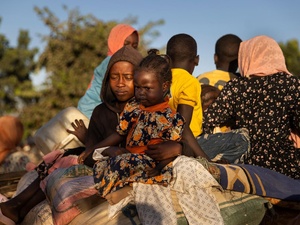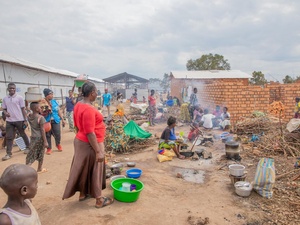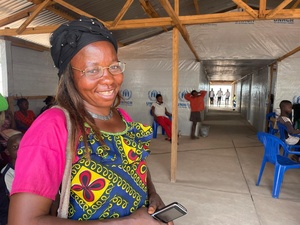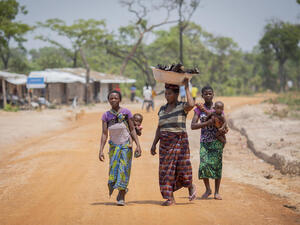First group of organised Angolan returnees almost home
First group of organised Angolan returnees almost home
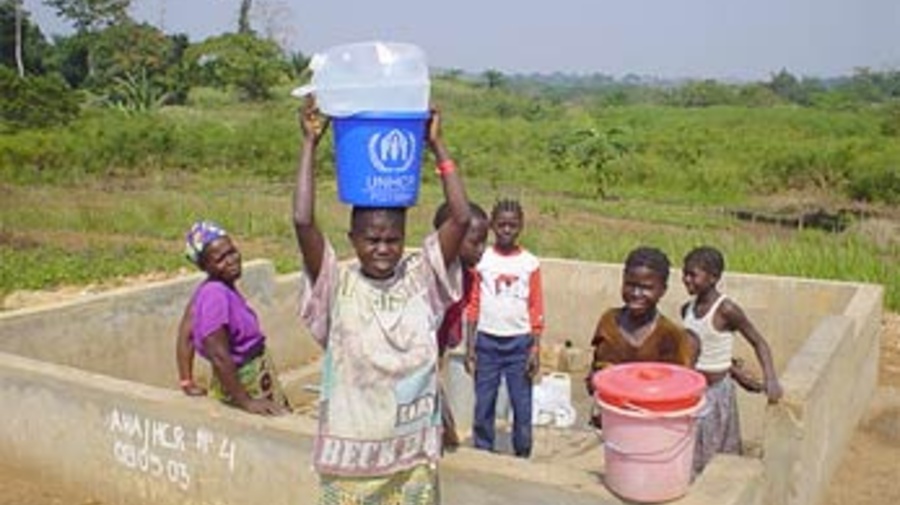
Angolan returnees getting potable water at a well at Kiowa reception centre in Angola.
LUAU, Angola, June 23 (UNHCR) - A first group of 543 Angolan returnees have arrived safely in Angola, paving the way for tens of thousands of others set to follow this year.
Two separate convoys, with 306 and 237 refugees respectively, left camps in the Democratic Republic of the Congo (DRC) on Friday morning, in what was described as a "well synchronized and timely commencement of Angolan repatriation" by UNHCR's Acting Representative in the DRC, Alphonse Malanda.
From Angolan refugee camps in Kimpese, in the DRC's Bas-Congo province, 306 refugees were voluntarily repatriated in safety and dignity, and received at Luvo border crossing by the Angolan Minister of Reinsertion and Social Affairs, João Battista Kussumua, and UNHCR's Regional Coordinator for the Angolan operation, Kallu Kalumiya.
A short ceremony marking the official start of the organised repatriation to Angola was held in the presence of the DRC's Ministers of Interior, Defense and Social Affairs; the Governor of Zaïre province in Angola and other officials and aid workers.
At the border, UNHCR's Kalumiya and the Angolan Minister of Reinsertion and Social Affaires signed a bilateral agreement establishing the rights of refugees returning to their homeland, be they from the DRC or from another country of asylum. For instance, it sets their right to choose where they want to return, to recover lost property, the right to non-discrimination as well as the right for foreign-born spouses to return to Angola with them.
For UNHCR, it facilitates the work of the agency and its partners on the ground, in terms of access to the areas of return and the import of goods needed for the humanitarian assistance operation.
The agreement completes the existing legal framework, which was set up in the form of tripartite agreements signed at the end of last year between Angola, UNHCR and the main asylum countries (namely Zambia, the DRC, Namibia and the Republic of Congo).
From refugee camps in Kisenge, in DRC's Katanga province, 237 refugees were repatriated to Luau, in the eastern reaches of Angola.
The returnees reached the two reception centres in M'Banza Congo and Luau respectively, amid cheers from their compatriots holding banners and welcoming them back home.
"There was quite a good feeling at the reception centre," said Matthew Brook, UNHCR's press officer who was present for the M'Banza Congo leg of the operation. "The line of 15 trucks came in, people waited patiently for the registration process and the distribution of relief material to take place."
Over the weekend, the returnees received food and a package of domestic items that had been agreed for the repatriation - including blankets, kitchen sets and plastic sheeting. They were also given training in HIV/AIDS and mine-awareness. Returnees from camps tend to be better informed on HIV/AIDS, and the additional training should help them educate their fellow Angolans on the disease. Mine-awareness training is also crucial as Angola is one of the most heavily-mined countries in the world, with estimates sometimes reaching 12 million mines, or one mine per Angolan.
Construction sets for shelter or to rebuild their homes will also be distributed later. Some of the refugees who live in the towns will be able to head out of the reception centres and back to their home areas in the next couple of days. Others who live outside the towns in rural areas will have to wait for transport arrangements.
Two more convoys are planned for this week from the DRC - one on Tuesday to M'Banza Congo and one on Thursday to Luau. UNHCR is hoping to run twice-weekly convoys once the dust has settled after the first day's excitement and the convoys are able to run smoothly.
Repatriation from Namibia is set to start on July 2 to Caiundo in Angola's Cuando Cubango province. From Meheba camp in western Zambia, the first convoy is scheduled for July 11, to Cazombo in Angola's eastern Moxico province. UNHCR is also working with the Angolan government on improving the road from M'Banza Congo to Cuimba, in Zaïre province, home to thousands of refugees hoping to return from the DRC.


